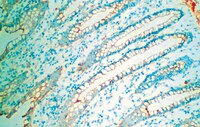Intestinal epithelial wound healing assay in an epithelial-mesenchymal co-culture system.
Seltana, Amira, et al.
Wound Repair Regen, 18: 114-22
2009
Show Abstract
Rapid and efficient healing of epithelial damage is critical to the functional integrity of the small intestine. Epithelial repair is a complex process that has largely been studied in cultured epithelium but to a much lesser extent in mucosa. We describe a novel method for the study of wound healing using a co-culture system that combined an intestinal epithelial Caco-2/15 cell monolayer cultured on top of human intestinal myofibroblasts, which together formed a basement membrane-like structure that contained many of the major components found at the epithelial-mesenchymal interface in the human intestine. To investigate the mechanism of restitution, small lesions were generated in epithelial cell monolayers on plastic or in co-cultures without disturbing the underlying mesenchymal layer. Monitoring of wound healing showed that repair was more efficient in Caco-2/15-myofibroblast co-cultures than in Caco-2/15 monolayers and involved the deposition of basement membrane components. Functional experiments showed that the addition of type I collagen or human fibronectin to the culture medium significantly accelerated wound closure on epithelial cell co-cultures. This system may provide a new tool to investigate the mechanisms that regulate wound healing in the intestinal epithelium. | 20082684
 |











